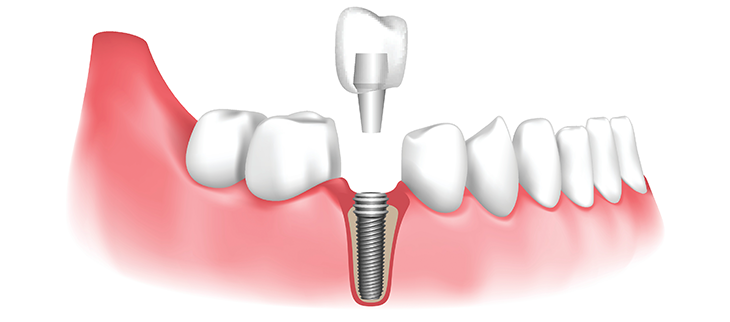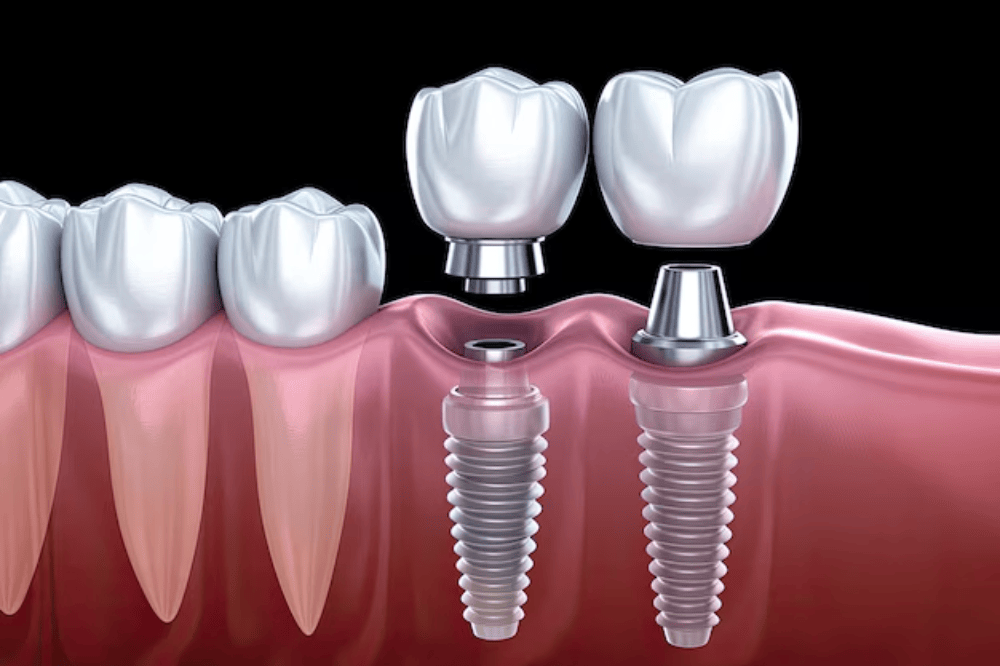Dental implants have transformed modern dentistry, offering patients a reliable solution for missing teeth with natural-looking results. They provide comfort, durability, and improved confidence compared to traditional dentures or bridges. However, despite their high success rate, dental implants are not immune to complications. In some cases, patients may experience implant failure, which can be both physically uncomfortable and emotionally discouraging.
Understanding the common causes of implant failure is essential for anyone considering this treatment. By learning what factors contribute to complications—such as infections or poor bone integration—patients can take proactive steps to protect their oral health and ensure long-term success. This article explores the most frequent reasons why dental implants fail and provides practical prevention strategies that every patient should know.
Understanding Dental Implants: A Brief Overview
Dental implants are one of the most advanced solutions in modern dentistry for replacing missing teeth. Unlike removable dentures, implants are surgically placed into the jawbone, acting as artificial tooth roots that support crowns, bridges, or even full dentures. This integration with the bone gives implants superior stability, allowing patients to chew, speak, and smile with confidence.

The structure of a dental implant typically includes three parts: the titanium post inserted into the jawbone, the abutment that connects the post to the visible restoration, and the crown, which mimics the natural tooth. This design not only restores function but also preserves the jawbone, preventing the bone loss that often occurs after tooth loss.
One of the greatest advantages of dental implants is their longevity. With proper care, they can last decades or even a lifetime, making them a worthwhile investment for many patients. However, the success of this treatment depends on several factors, including the patient’s oral health, the skill of the dentist, and adherence to aftercare instructions.
Although success rates for dental implants are generally very high—often exceeding 90–95%—it is still possible for complications to arise. Understanding these risks is crucial before undergoing treatment, as being informed can help patients prepare and minimize the chances of implant failure.
Why Do Dental Implants Fail? The Most Common Causes
While dental implants are highly successful, a small percentage of patients may experience failure. Understanding the reasons behind this is essential, as it allows both patients and dentists to take preventive measures. Implant failure can occur shortly after surgery or even years later, and the causes often fall into several key categories.
One of the most common reasons is poor oral hygiene, which can lead to infections around the implant site. Just like natural teeth, implants require consistent cleaning to prevent bacterial buildup. If bacteria spread deep into the gums and surrounding bone, they can compromise the implant’s stability.

Another major factor is insufficient bone density or volume. For implants to succeed, they must fuse with the jawbone in a process called osseointegration. If the bone is too weak or thin, the implant may not integrate properly, leading to loosening or eventual failure. This is why bone grafting is sometimes recommended before the procedure.
Medical conditions also play a role. Patients with uncontrolled diabetes, autoimmune disorders, or those who smoke heavily are at higher risk of complications. These conditions can interfere with healing, reduce blood flow, and hinder bone regeneration.
Lastly, surgical or technical errors can contribute to implant failure. Factors such as improper placement, overloading the implant too soon, or using substandard materials may reduce long-term success.
By identifying these risks, patients can work closely with their dental team to minimize potential issues and enjoy the full benefits of dental implants.
Infections Around Dental Implants (Peri-implantitis)
One of the most serious complications that can affect dental implants is an infection known as peri-implantitis. This condition occurs when bacteria accumulate around the implant site, leading to inflammation of the gums and potential damage to the surrounding bone. If not treated promptly, peri-implantitis can cause the implant to loosen and ultimately fail.
The early signs of peri-implantitis are often mild, such as redness, swelling, or bleeding when brushing. However, as the infection progresses, patients may experience pain, gum recession, or even pus discharge. In advanced cases, significant bone loss can occur, jeopardizing the stability of the implant.

Several factors increase the risk of peri-implantitis. Poor oral hygiene is the most common cause, but smoking, untreated gum disease, and systemic conditions like diabetes can also make patients more vulnerable. Even small issues, such as ill-fitting crowns or excessive bite pressure, may contribute to the development of infection.
Preventing peri-implantitis requires a proactive approach. Patients must commit to excellent oral hygiene practices, including daily brushing, flossing, and regular dental check-ups. Professional cleanings are also essential to remove plaque and tartar that cannot be addressed at home.
When detected early, peri-implantitis can often be managed with non-surgical treatments, such as deep cleaning or antibiotics. In more advanced cases, surgical intervention may be necessary to restore the affected tissues. The key is early detection and consistent care to ensure the long-term success of dental implants.
Bone Integration Problems: When Implants Don’t Fuse Properly
For dental implants to be successful, they must undergo a process called osseointegration. This is when the titanium post bonds directly with the jawbone, creating a stable foundation for the artificial tooth. Without proper integration, the implant may become loose, painful, or even fail completely.
Several factors can interfere with this critical process. Insufficient bone density is one of the most common issues. If a patient’s jawbone is too thin or weak, the implant may not be able to fuse securely. In such cases, dentists often recommend bone grafting or sinus lift procedures to strengthen the bone before implant placement.
Another risk factor is premature loading of the implant. If the crown or bridge is placed too soon—before the bone has fully healed—the implant may not have enough time to integrate properly. Similarly, excessive biting pressure or clenching (bruxism) can put additional stress on the healing implant.
Medical conditions also play a role. Patients with uncontrolled diabetes, osteoporosis, or immune system disorders may experience slower healing, reducing the likelihood of successful osseointegration. Lifestyle choices, such as smoking, can further compromise blood flow and bone regeneration.
To minimize these risks, dentists carefully evaluate each patient’s oral and medical health before recommending dental implants. With proper planning, adequate healing time, and regular follow-up care, the chances of achieving strong bone integration are significantly increased.
How to Prevent Dental Implant Failure: Expert Tips
While complications can occur, most dental implants are highly successful when patients and dentists work together to follow proper preventive measures. Taking the right steps before, during, and after treatment dramatically increases the chances of long-term success.
1. Choose an experienced dentist
The skill and expertise of the dental surgeon play a major role in the outcome. An experienced professional will carefully assess your oral health, bone density, and medical history before recommending dental implants. This reduces the likelihood of surgical errors and ensures proper implant placement.
2. Prioritize oral hygiene
Daily brushing, flossing, and the use of antibacterial mouthwash help keep harmful bacteria under control. Regular dental check-ups allow for early detection of potential issues like gum inflammation or peri-implantitis before they progress.
3. Address underlying health issues
Conditions such as uncontrolled diabetes, osteoporosis, or smoking habits must be managed prior to implant surgery. Healthy lifestyle changes, quitting smoking, and following your physician’s advice can greatly improve healing and reduce risks.
4. Follow post-surgery instructions
After implant placement, patients should avoid chewing hard foods, smoking, or applying unnecessary pressure to the implant during the healing phase. Strictly adhering to your dentist’s aftercare guidelines allows osseointegration to take place successfully.
5. Schedule regular professional cleanings
Even with excellent home care, plaque and tartar can build up around dental implants. Professional cleanings ensure that the implant site remains healthy and stable over time.
By following these expert tips, patients can significantly reduce the risk of implant failure and enjoy the long-lasting benefits of dental implants with confidence.
Long-Term Care and Maintenance for Healthy Dental Implants
Ensuring the long-term success of dental implants requires ongoing care and attention. While implants are designed to last for decades, they still need proper maintenance, just like natural teeth.
Regular dental visits are essential. Dentists can monitor the health of your gums and bone, identify early signs of complications, and professionally clean areas that are difficult to reach at home.
Daily oral hygiene remains critical. Brushing at least twice a day, flossing, and using antimicrobial mouth rinses help prevent plaque buildup, which is a leading cause of infection and implant failure.
Lifestyle habits also play a role. Avoiding smoking, limiting sugary foods, and managing conditions such as diabetes can significantly improve implant longevity. Additionally, using a night guard may be recommended for patients who grind or clench their teeth, protecting the implants from excessive stress.
By committing to these habits, patients can maintain healthy dental implants for many years, enjoying the full functional and aesthetic benefits of this advanced dental treatment. Consistent care ensures that implants remain a reliable and confidence-boosting solution for missing teeth.
Conclusion
Dental implants are a reliable and long-lasting solution for replacing missing teeth, but their success depends on careful planning, proper oral hygiene, and regular professional care. Understanding the common causes of implant failure—such as infections, poor bone integration, or lifestyle factors—can help patients take proactive steps to protect their investment in oral health.
By following expert tips, attending regular dental check-ups, and addressing any underlying health conditions, patients can significantly reduce the risk of complications and enjoy the functional and aesthetic benefits of dental implants for many years.
If you are considering dental implants and want a procedure that prioritizes quality, safety, and long-term results, the team at admiredclinic in Clacton can guide you through every step of the process.


